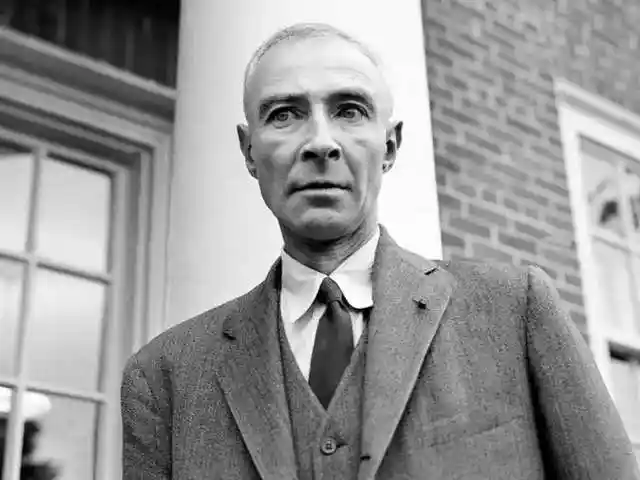“Oppenheimer: The Father of Nuclear Bombs and His Complex Legacy”
Julius Robert Oppenheimer, a brilliant scientist hailed as the father of nuclear bombs, is set to take the center stage in a highly-anticipated biopic titled “Oppenheimer“, directed by Christopher Nolan. The film, starring Cillian Murphy in the lead role, delves into the life of this legendary figure, exploring his pivotal role in the Manhattan Project and the moral complexities of his contributions to science.
Born on April 22, 1904, to German Jewish immigrant parents, Oppenheimer’s early life was marked by academic excellence. He graduated with honors in Chemistry from Harvard University in 1925, later obtaining a Ph.D. in physics from the University of Göttingen in Germany in 1927. At just 32, he became a full professor at the University of California, Berkeley, where he made significant contributions to the fields of neutron stars, quantum fields, black holes, and cosmic ray interactions.
Oppenheimer’s defining moment came during World War II when he was appointed the head of the research and development team of the Manhattan Project in 1942. This project, born out of fears that Germany would build a nuclear bomb before the Allies, led to the creation of the first atomic bomb. The historical Trinity test in 1945 witnessed the detonation of the first atomic bomb in New Mexico’s Jornada del Muerto desert.
Despite his monumental achievements in science, Oppenheimer’s life was marked by controversy and political struggles. His communist leanings and associations with individuals linked to the Communist Party drew suspicion from the Federal Bureau of Investigation. After expressing strong opposition to the bombings of Hiroshima and Nagasaki and advocating for a ban on further nuclear weapons research, he faced a security hearing in 1953, resulting in the revocation of his security clearance.
Beyond his scientific contributions, Oppenheimer’s personal life garnered attention. He married American biologist Katherine “Kitty” Oppenheimer in 1940 and had two children. However, an affair with American psychiatrist Jean Tatlock before his marriage caused turbulence in his personal life.
The film “Oppenheimer” seeks to explore these complexities, shedding light on the man behind the scientific genius. Christopher Nolan, known for his blockbuster productions, promises an unmatched cinematic experience with his aversion to computer-generated imagery and focus on cutting-edge technology for analog effects. The star-studded cast includes Emily Blunt, Robert Downey Jr., Florence Pugh, and Matt Damon.
As the world grapples with renewed nuclear threats amidst the backdrop of Russian aggression in Ukraine, “Oppenheimer” serves as a timely reminder of the profound impact of scientific discoveries and the ethical dilemmas they present. The biopic is slated to hit theaters on Friday, 21st of July, inviting audiences to reflect on the complex legacy of the man who played a pivotal role in shaping the course of history.
10 key things to know about Julius Robert Oppenheimer:
1. Early Life: Julius Robert Oppenheimer was born on April 22, 1904, to German Jewish immigrant parents. His father, Julius S. Oppenheimer, was a wealthy German textile merchant who moved to the United States in 1888, while his mother, Ella Friedman, was a painter.
2. Academic Brilliance: Oppenheimer excelled academically, graduating with honors from Harvard University in 1925 with a bachelor’s degree in Chemistry. He furthered his education in physics and earned a Ph.D. from the University of Göttingen, Germany, in 1927.
3. Contributions to Science: As a physicist, Oppenheimer made significant contributions to various fields, including neutron stars, quantum fields, black holes, and cosmic ray interactions. He also played a vital role in developing the Born-Oppenheimer approximation in molecular dynamics and the Oppenheimer–Phillips process in nuclear fusion.
4. Manhattan Project: Oppenheimer’s most significant contribution came during World War II when he was appointed the head of the research and development team for the Manhattan Project in 1942. The project aimed to build the first atomic bomb, and Oppenheimer played a central role in its successful realization.
5. Trinity Test: On July 16, 1945, Oppenheimer witnessed the first successful test of an atomic bomb during the Trinity test in New Mexico’s Jornada del Muerto desert. The successful detonation marked a turning point in human history, unleashing the power of nuclear weapons.
6. Controversies and Political Struggles: Oppenheimer’s leftist political leanings and associations with individuals linked to the Communist Party drew scrutiny from government agencies. He faced a security hearing in 1953 due to suspicions about his loyalty to the United States, resulting in the revocation of his security clearance.
7. Personal Life: Oppenheimer married American biologist Katherine “Kitty” Oppenheimer in November 1940, and they had two children together. However, he was involved in an affair with American psychiatrist Jean Tatlock before his marriage, which later caused personal turbulence.
8. Ethical Dilemmas: Despite his instrumental role in developing nuclear weapons, Oppenheimer expressed strong moral concerns about their use. He vehemently opposed the bombings of Hiroshima and Nagasaki, advocating for a ban on further nuclear weapons research.
9. Scientific Legacy: Beyond his work on nuclear weapons, Oppenheimer’s scientific achievements earned him recognition and respect in the scientific community. His 1966 article, “On Albert Einstein,” revealed his close friendship with the renowned physicist.
10. Legacy and Recognition: Julius Robert Oppenheimer’s legacy remains complex and multifaceted. While he is celebrated for his scientific brilliance and leadership during the Manhattan Project, his involvement in the development of nuclear weapons also raises ethical questions. Despite the controversies surrounding him, Oppenheimer’s contributions to science and his role in shaping the course of history are undeniable, making him a significant figure in the 20th century scientific community.






